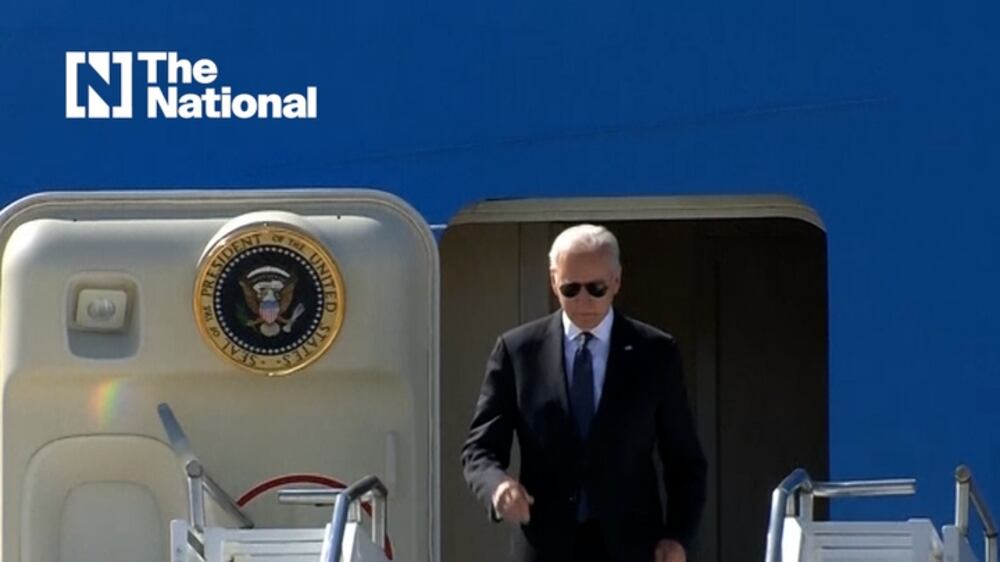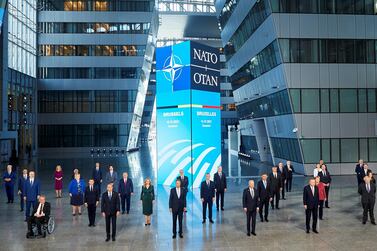US President Joe Biden will face his biggest diplomatic challenge yet when he meets his Russian counterpart Vladimir Putin on Wednesday.
The two men are meeting in a summit aimed at addressing the downward spiral in relations between the two powers.
Mr Biden has said he seeks a stable and predictable relationship with Russia. But bilateral ties are at an all-time low amid allegations of Russian meddling in US elections. The two nations have traded sanctions, expelled diplomats, remained at policy odds from Europe to Myanmar and have accused one another of carrying out cyber attacks.
For Mr Biden, the fifth US president to meet Mr Putin, another objective would be to avoid the sorts of missteps made by his predecessors.
Unlike after previous US-Russia summits, there will be no joint press conference. Mr Biden will hold his own, solo briefing.
Russia’s strongman came out on top in his joint conferences with Donald Trump in Helsinki in 2018 and with George W Bush in Slovenia in 2001.
Mr Trump famously sided with Russia against the US intelligence community, and Mr Bush said he found Mr Putin, a former KGB operative, "straightforward and trustworthy" and was able "get a sense of his soul".
By scrapping the joint press conference, the Biden administration hopes to avoid such moments.
CNN reported that Mr Biden has been preparing with advisers during the morning hours of his trip to Europe. First lady Jill Biden said the 46th president "loves foreign policy" and is “over-prepared" for the summit.
Mr Biden is consulting with European counterparts including Germany’s Chancellor Angela Merkel in trying to forge a common transatlantic position.
"A successful summit will be one that allows Joe Biden to meet Mr Putin having already gained overwhelming support from Washington's European allies," Timothy Frye, a professor of post-Soviet politics at New York's Columbia University, told The National.
Mr Frye, author of Weak Strongman: The Limits of Power in Putin's Russia, said the two sides had different expectations but both recognised the "narrow set" of issues for agreement.
“Washington would like to turn attention to China and relations with European allies, while struggling to resolve a deep political crisis at home," he said.
"Moscow, too, is focused on multiple crises in their domestic politics and seems more interested in using a hardline foreign policy to appeal to hardliners at home."
With expectations so low, Mr Frye argues that a small improvement could be enough for Washington.
“A successful summit will be one that begins to put a bottom under the relationship by agreeing to begin talks on strategic stability and by starting to repair diplomatic relations, including the return of ambassadors and increases in diplomatic staffing," he said.
But Maxim Suchkov, director of the Centre for Advanced American Studies at MGIMO University in Moscow, worries about a further deterioration in the relationship – especially on the military front – if the summit does not produce tangible progress.
"I wouldn't be surprised if the relationship continues to deteriorate. There are many reasons for why it should and plenty of areas where it can get worse," Mr Suchkov told The National.
“The return of both ambassadors to respective capitals, restoration of normal diplomatic services would be a start, [and] if a swap of Russian and American citizens detained in the US and Russia respectively is organised – that would be a success,” he said.
The summit would exceed expectations if “some framework agreements for strategic stability are negotiated and/or some working groups are established to discuss these issues or a military-to-military channel is organised,” he added.
On the Middle East, Mr Suchkov said an agreement on Syria was unlikely, but did note the possibility of a constructive US-Russian approach on the Palestinian-Israeli conflict.
Avoiding a military clash is the most urgent priority at the summit, Mr Suchkov said, pointing to the large number of Nato troops stationed near Russia’s borders – in the Baltic especially.
"An equally big number of Russian troops is near the borders of Nato states and states that the US would like to see join the alliance – Ukraine, Georgia – as well as in the Black Sea,” he said.
The US and Russian militaries are also operating in proximity across the globe from Syria to the Arctic.
“An unintended military clash would put both countries at a greater, nuclear risk," Mr Suchkov said.
Mitigating that risk is an immediate priority in Geneva even as political and cyber confrontations continue.
“At this point, Moscow and Washington are pretty far apart on how they see the future of the world order,” Mr Suchkov said.








